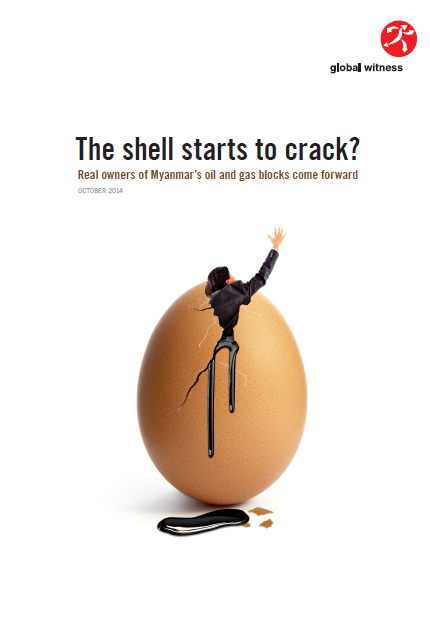The Shell Starts to Crack? Real Owners of Myanmar’s Oil and Gas Come Forward
By Global Witness • October 12, 2014Corrupt politicians all over the world use companies and trusts with hidden ownership to seize public property worth billions of dollars. This deprives ordinary citizens of money that should be spent on development and empowers unaccountable elites, often helping them gain and maintain power at the expense of democracy, human rights and peace.
Revealing the real people behind companies is critical to achieving genuine reform in Myanmar, where military families and crony tycoons have long benefited from control of natural resources like gas and gemstones. This is a critical time—in July 2014, Myanmar became a candidate member of the Extractive Industries Transparency Initiative (EITI), a global transparency standard which recommends that the
identities of individuals who own and control oil, gas and mining companies are published. If Myanmar can meet the standard, it will go a long way to addressing the question of who really owns the companies that control the country’s most valuable natural assets.
To test the waters, Global Witness asked each of the companies granted oil and gas blocks in Myanmar over the past 12 months to declare their ultimate beneficial ownership. These blocks were awarded in the wake of a public commitment by the Ministry of Energy to manage Myanmar’s energy sector in line with international best practices, and alongside the engagement of leading energy companies in Myanmar’s EITI process.
As such, the willingness of block winners to open up their ownership is an important yardstick for progress on reform of Myanmar’s extractive industries.
Key findings
• Over the past 12 months, Myanmar has awarded 36 oil and gas blocks to 46 international and local companies, with all but one block held by two or more companies in partnership. There are 17 blocks where all companies holding a stake have fully declared their ultimate ownership in responses to Global Witness. This makes Myanmar the current global leader on company ownership publication, setting an important precedent on which the government, legislators and the Myanmar EITI can build.
• For 26 blocks, international companies were required to partner with a Myanmar company. Of the 15 private Myanmar companies which won oil and gas block stakes, eight (i.e. just over half) have fully declared who ultimately owns and controls them. In addition, five private international companies chose to provide partial or full ownership information to Global Witness.
• The response rate improved dramatically after an earlier publication by Global Witness drew attention to the problem of opaque company ownership, and the reputational impacts for companies. The subsequent flood of declarations shows that private companies can and will declare their ultimate beneficial owners if they have the right incentive.
• A hard core of seven Myanmar companies and 11 international companies have not declared their ownership, showing that more work is needed to tackle this corruption risk.
• In a number of instances, company responses have suggested corrections or additions to the notices published by Myanmar’s Ministry of Energy on which companies won which blocks. Some respondents told Global Witness that the published names of the winning companies were incorrect or incomplete. This illustrates the importance of making such details public so that they can be independently checked and any errors, inadvertent or deliberate, can be identified and scrutinised.
Recommendations
• All oil, gas and mining companies operating in Myanmar should publish details of the individuals who ultimately own and control them.
• Myanmar’s EITI process should prioritise the disclosure of company ownership, and establish this as a standard for the extractive industries. Particular attention should be given to the ownership of companies that hold concessions in conflict-affected areas.
• Myanmar’s government and parliament should build requirements for ultimate beneficial ownership disclosure into the new laws and regulations being developed for the oil, gas, mineral, and gemstone sectors. These laws should also protect the rights of citizens to raise concerns over corruption, conflicts of interests or companies’ breaches of their obligations to local people.
• The Myanmar government and extractive industry companies engaged in the country should agree a standard for companies to display, substantiate and update ultimate beneficial ownership information.
• The World Bank, US, UK, Norway, Australia and other donors supporting extractives sector reform in Myanmar should vigorously promote beneficial ownership disclosure, through initiatives like the EITI and reforms to the country’s legal framework.
Download the full report here.
Tags: Burma Government, Corruption, Gas, Global Witness, Human Rights, Ministry of Energy, Norway, UK, US, World BankThis post is in: Business and Human Rights, Spotlight
Related PostsLand Policies and Laws Must Reflect Rights and Interests of Vulnerable Communities
Yearning to be Heard: Mon Farmers’ Continued Struggle for Acknowledgement and Protection of their Rights
WORLD REPORT 2015
A Briefing by Burmese Rohingya Organization UK: International Investigation Urgently Needed into Human Rights Abuses Against the Rohingya
Burma: Stop Christian cross Removal; Drop Trumped-up Charges










 All posts
All posts